Contemporary Hospitality Industry Report: Structure, Roles, Trends
VerifiedAdded on 2022/12/30
|13
|4061
|30
Report
AI Summary
This report provides a comprehensive analysis of the contemporary hospitality industry. It begins with an introduction to the industry, its structure, scope, and size. The report then delves into the different operational roles within the industry, such as executives, front desk services, housekeeping, maintenance, marketing & sales, kitchen staff, accounting, and HR. It also addresses the skills gaps prevalent in the hospitality sector, including shortages of skilled and unskilled workers, and the reasons behind these shortages. The report further examines both external factors, using a PESTLE analysis (Political, Economic, Social, Technological, Legal, and Environmental), and internal factors that influence the hospitality industry. Finally, it explores current and potential trends shaping the industry, concluding with a reflection on the key findings and recommendations.
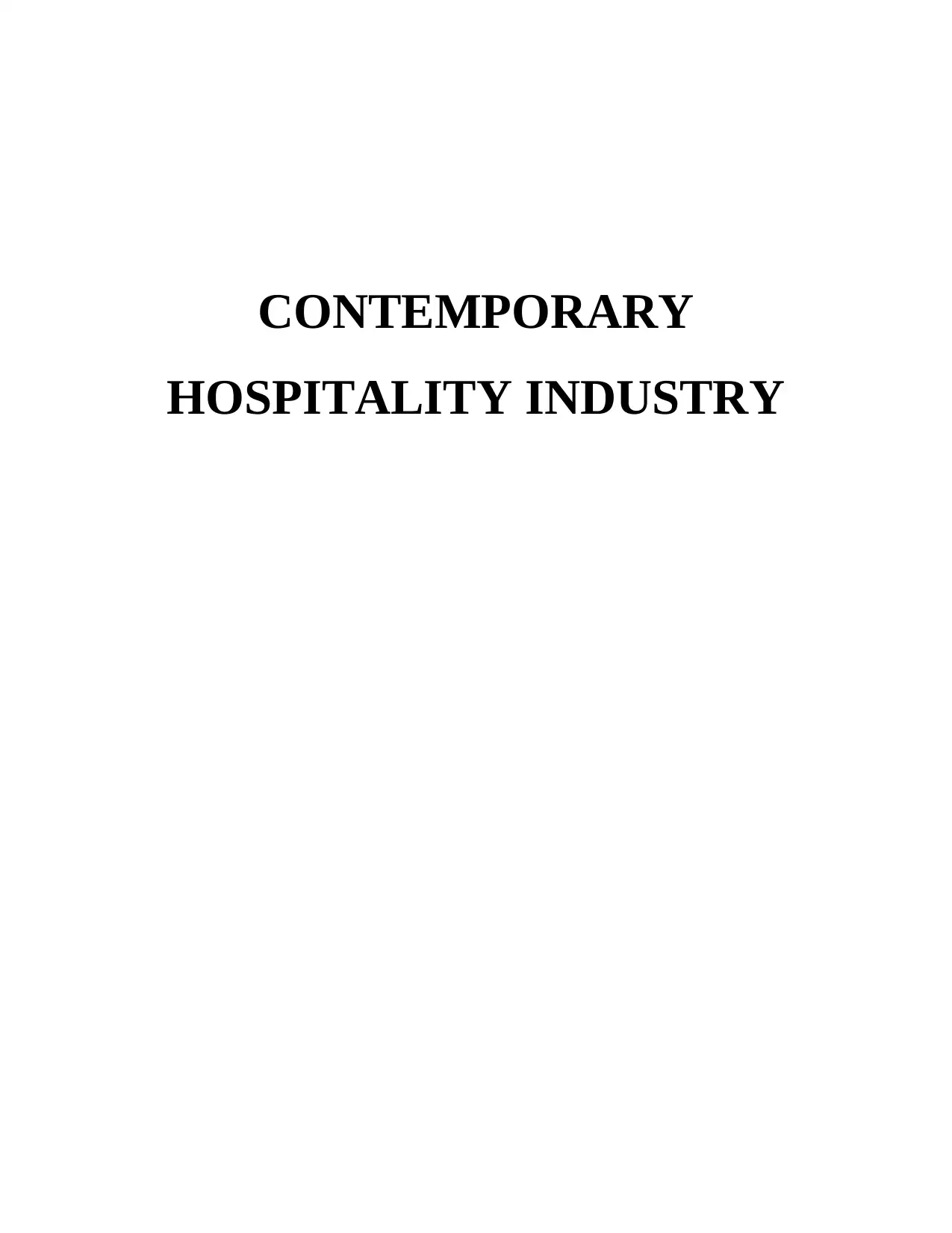
CONTEMPORARY
HOSPITALITY INDUSTRY
HOSPITALITY INDUSTRY
Paraphrase This Document
Need a fresh take? Get an instant paraphrase of this document with our AI Paraphraser
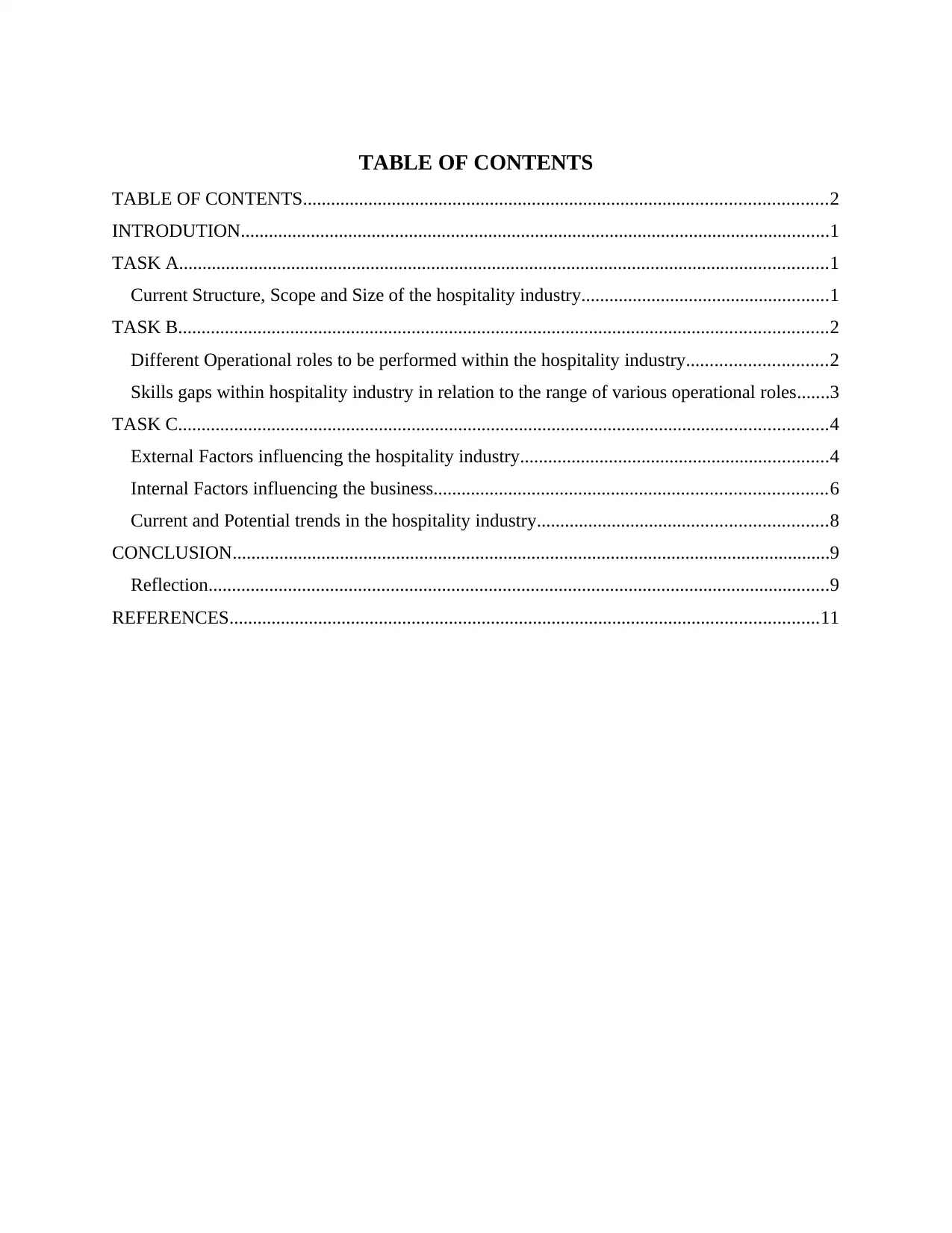
TABLE OF CONTENTS
TABLE OF CONTENTS................................................................................................................2
INTRODUTION..............................................................................................................................1
TASK A...........................................................................................................................................1
Current Structure, Scope and Size of the hospitality industry.....................................................1
TASK B...........................................................................................................................................2
Different Operational roles to be performed within the hospitality industry..............................2
Skills gaps within hospitality industry in relation to the range of various operational roles.......3
TASK C...........................................................................................................................................4
External Factors influencing the hospitality industry..................................................................4
Internal Factors influencing the business....................................................................................6
Current and Potential trends in the hospitality industry..............................................................8
CONCLUSION................................................................................................................................9
Reflection.....................................................................................................................................9
REFERENCES..............................................................................................................................11
TABLE OF CONTENTS................................................................................................................2
INTRODUTION..............................................................................................................................1
TASK A...........................................................................................................................................1
Current Structure, Scope and Size of the hospitality industry.....................................................1
TASK B...........................................................................................................................................2
Different Operational roles to be performed within the hospitality industry..............................2
Skills gaps within hospitality industry in relation to the range of various operational roles.......3
TASK C...........................................................................................................................................4
External Factors influencing the hospitality industry..................................................................4
Internal Factors influencing the business....................................................................................6
Current and Potential trends in the hospitality industry..............................................................8
CONCLUSION................................................................................................................................9
Reflection.....................................................................................................................................9
REFERENCES..............................................................................................................................11
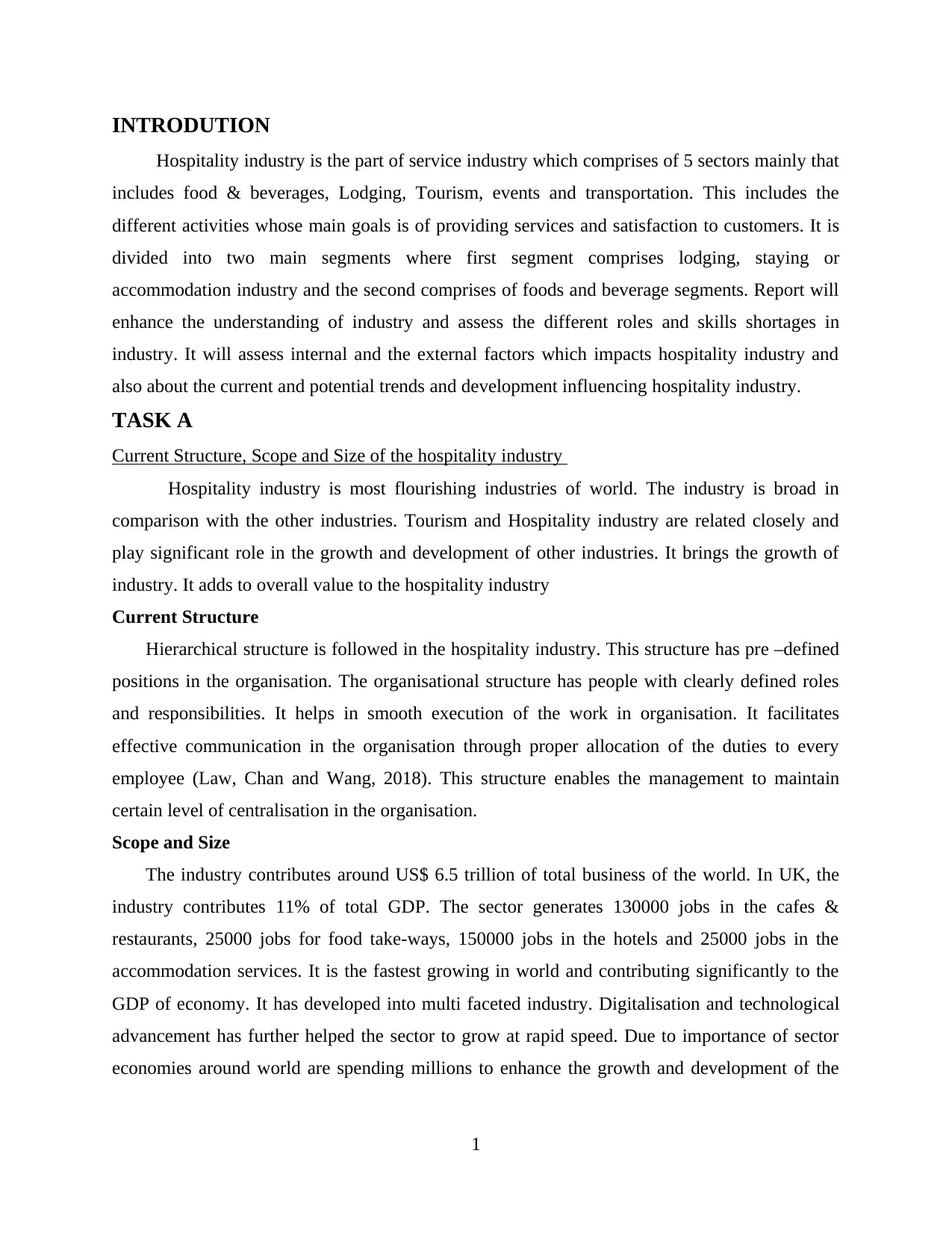
INTRODUTION
Hospitality industry is the part of service industry which comprises of 5 sectors mainly that
includes food & beverages, Lodging, Tourism, events and transportation. This includes the
different activities whose main goals is of providing services and satisfaction to customers. It is
divided into two main segments where first segment comprises lodging, staying or
accommodation industry and the second comprises of foods and beverage segments. Report will
enhance the understanding of industry and assess the different roles and skills shortages in
industry. It will assess internal and the external factors which impacts hospitality industry and
also about the current and potential trends and development influencing hospitality industry.
TASK A
Current Structure, Scope and Size of the hospitality industry
Hospitality industry is most flourishing industries of world. The industry is broad in
comparison with the other industries. Tourism and Hospitality industry are related closely and
play significant role in the growth and development of other industries. It brings the growth of
industry. It adds to overall value to the hospitality industry
Current Structure
Hierarchical structure is followed in the hospitality industry. This structure has pre –defined
positions in the organisation. The organisational structure has people with clearly defined roles
and responsibilities. It helps in smooth execution of the work in organisation. It facilitates
effective communication in the organisation through proper allocation of the duties to every
employee (Law, Chan and Wang, 2018). This structure enables the management to maintain
certain level of centralisation in the organisation.
Scope and Size
The industry contributes around US$ 6.5 trillion of total business of the world. In UK, the
industry contributes 11% of total GDP. The sector generates 130000 jobs in the cafes &
restaurants, 25000 jobs for food take-ways, 150000 jobs in the hotels and 25000 jobs in the
accommodation services. It is the fastest growing in world and contributing significantly to the
GDP of economy. It has developed into multi faceted industry. Digitalisation and technological
advancement has further helped the sector to grow at rapid speed. Due to importance of sector
economies around world are spending millions to enhance the growth and development of the
1
Hospitality industry is the part of service industry which comprises of 5 sectors mainly that
includes food & beverages, Lodging, Tourism, events and transportation. This includes the
different activities whose main goals is of providing services and satisfaction to customers. It is
divided into two main segments where first segment comprises lodging, staying or
accommodation industry and the second comprises of foods and beverage segments. Report will
enhance the understanding of industry and assess the different roles and skills shortages in
industry. It will assess internal and the external factors which impacts hospitality industry and
also about the current and potential trends and development influencing hospitality industry.
TASK A
Current Structure, Scope and Size of the hospitality industry
Hospitality industry is most flourishing industries of world. The industry is broad in
comparison with the other industries. Tourism and Hospitality industry are related closely and
play significant role in the growth and development of other industries. It brings the growth of
industry. It adds to overall value to the hospitality industry
Current Structure
Hierarchical structure is followed in the hospitality industry. This structure has pre –defined
positions in the organisation. The organisational structure has people with clearly defined roles
and responsibilities. It helps in smooth execution of the work in organisation. It facilitates
effective communication in the organisation through proper allocation of the duties to every
employee (Law, Chan and Wang, 2018). This structure enables the management to maintain
certain level of centralisation in the organisation.
Scope and Size
The industry contributes around US$ 6.5 trillion of total business of the world. In UK, the
industry contributes 11% of total GDP. The sector generates 130000 jobs in the cafes &
restaurants, 25000 jobs for food take-ways, 150000 jobs in the hotels and 25000 jobs in the
accommodation services. It is the fastest growing in world and contributing significantly to the
GDP of economy. It has developed into multi faceted industry. Digitalisation and technological
advancement has further helped the sector to grow at rapid speed. Due to importance of sector
economies around world are spending millions to enhance the growth and development of the
1
⊘ This is a preview!⊘
Do you want full access?
Subscribe today to unlock all pages.

Trusted by 1+ million students worldwide
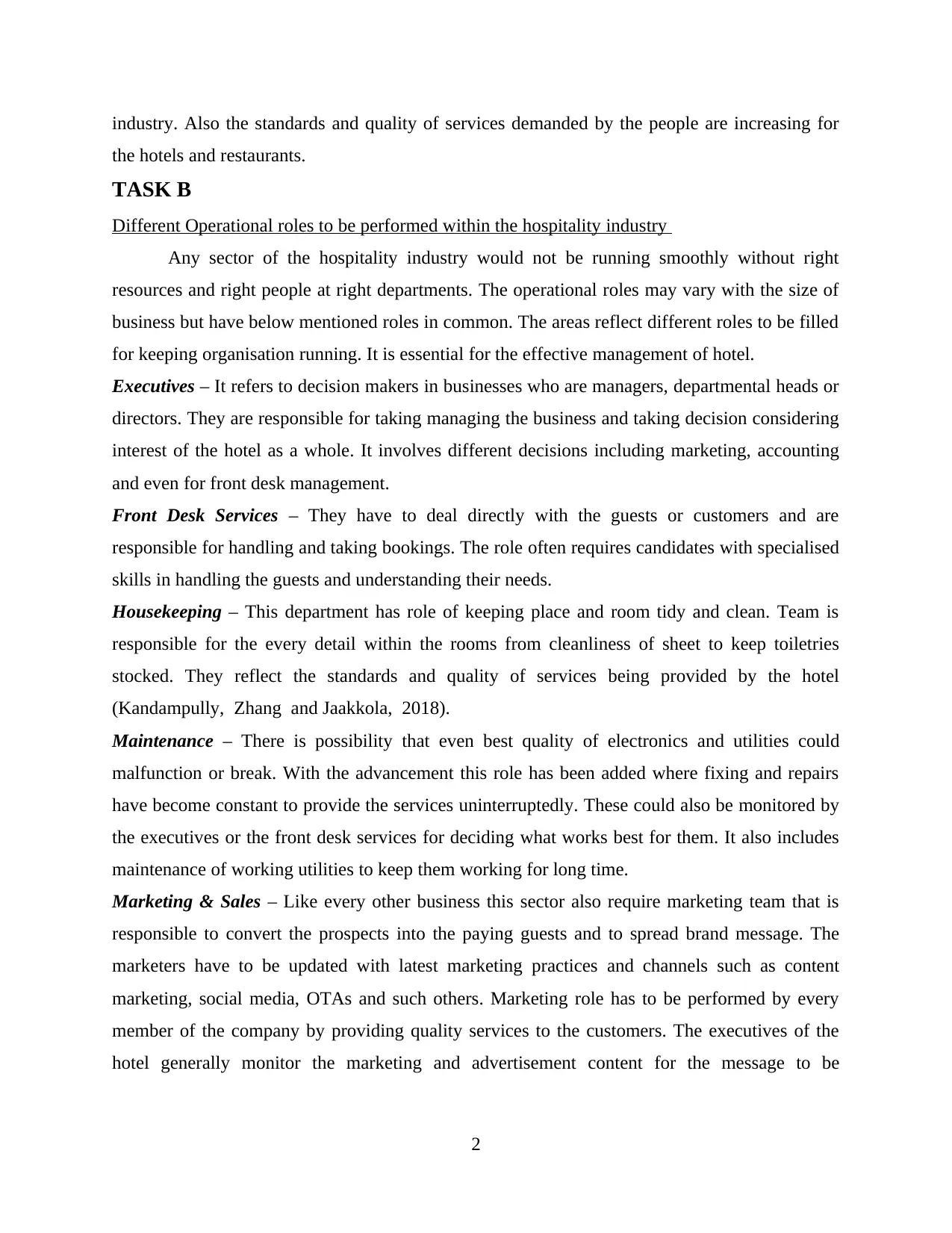
industry. Also the standards and quality of services demanded by the people are increasing for
the hotels and restaurants.
TASK B
Different Operational roles to be performed within the hospitality industry
Any sector of the hospitality industry would not be running smoothly without right
resources and right people at right departments. The operational roles may vary with the size of
business but have below mentioned roles in common. The areas reflect different roles to be filled
for keeping organisation running. It is essential for the effective management of hotel.
Executives – It refers to decision makers in businesses who are managers, departmental heads or
directors. They are responsible for taking managing the business and taking decision considering
interest of the hotel as a whole. It involves different decisions including marketing, accounting
and even for front desk management.
Front Desk Services – They have to deal directly with the guests or customers and are
responsible for handling and taking bookings. The role often requires candidates with specialised
skills in handling the guests and understanding their needs.
Housekeeping – This department has role of keeping place and room tidy and clean. Team is
responsible for the every detail within the rooms from cleanliness of sheet to keep toiletries
stocked. They reflect the standards and quality of services being provided by the hotel
(Kandampully, Zhang and Jaakkola, 2018).
Maintenance – There is possibility that even best quality of electronics and utilities could
malfunction or break. With the advancement this role has been added where fixing and repairs
have become constant to provide the services uninterruptedly. These could also be monitored by
the executives or the front desk services for deciding what works best for them. It also includes
maintenance of working utilities to keep them working for long time.
Marketing & Sales – Like every other business this sector also require marketing team that is
responsible to convert the prospects into the paying guests and to spread brand message. The
marketers have to be updated with latest marketing practices and channels such as content
marketing, social media, OTAs and such others. Marketing role has to be performed by every
member of the company by providing quality services to the customers. The executives of the
hotel generally monitor the marketing and advertisement content for the message to be
2
the hotels and restaurants.
TASK B
Different Operational roles to be performed within the hospitality industry
Any sector of the hospitality industry would not be running smoothly without right
resources and right people at right departments. The operational roles may vary with the size of
business but have below mentioned roles in common. The areas reflect different roles to be filled
for keeping organisation running. It is essential for the effective management of hotel.
Executives – It refers to decision makers in businesses who are managers, departmental heads or
directors. They are responsible for taking managing the business and taking decision considering
interest of the hotel as a whole. It involves different decisions including marketing, accounting
and even for front desk management.
Front Desk Services – They have to deal directly with the guests or customers and are
responsible for handling and taking bookings. The role often requires candidates with specialised
skills in handling the guests and understanding their needs.
Housekeeping – This department has role of keeping place and room tidy and clean. Team is
responsible for the every detail within the rooms from cleanliness of sheet to keep toiletries
stocked. They reflect the standards and quality of services being provided by the hotel
(Kandampully, Zhang and Jaakkola, 2018).
Maintenance – There is possibility that even best quality of electronics and utilities could
malfunction or break. With the advancement this role has been added where fixing and repairs
have become constant to provide the services uninterruptedly. These could also be monitored by
the executives or the front desk services for deciding what works best for them. It also includes
maintenance of working utilities to keep them working for long time.
Marketing & Sales – Like every other business this sector also require marketing team that is
responsible to convert the prospects into the paying guests and to spread brand message. The
marketers have to be updated with latest marketing practices and channels such as content
marketing, social media, OTAs and such others. Marketing role has to be performed by every
member of the company by providing quality services to the customers. The executives of the
hotel generally monitor the marketing and advertisement content for the message to be
2
Paraphrase This Document
Need a fresh take? Get an instant paraphrase of this document with our AI Paraphraser
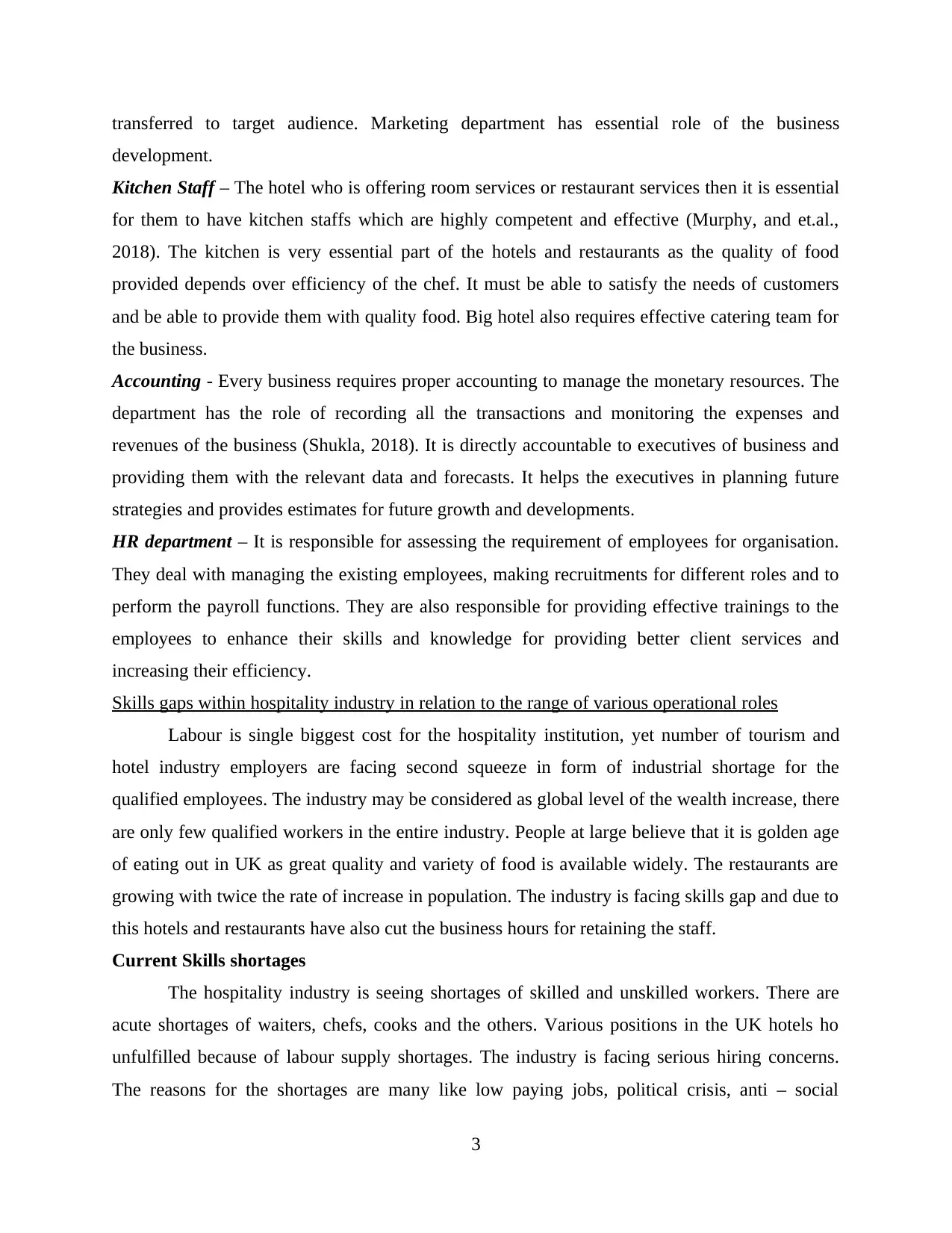
transferred to target audience. Marketing department has essential role of the business
development.
Kitchen Staff – The hotel who is offering room services or restaurant services then it is essential
for them to have kitchen staffs which are highly competent and effective (Murphy, and et.al.,
2018). The kitchen is very essential part of the hotels and restaurants as the quality of food
provided depends over efficiency of the chef. It must be able to satisfy the needs of customers
and be able to provide them with quality food. Big hotel also requires effective catering team for
the business.
Accounting - Every business requires proper accounting to manage the monetary resources. The
department has the role of recording all the transactions and monitoring the expenses and
revenues of the business (Shukla, 2018). It is directly accountable to executives of business and
providing them with the relevant data and forecasts. It helps the executives in planning future
strategies and provides estimates for future growth and developments.
HR department – It is responsible for assessing the requirement of employees for organisation.
They deal with managing the existing employees, making recruitments for different roles and to
perform the payroll functions. They are also responsible for providing effective trainings to the
employees to enhance their skills and knowledge for providing better client services and
increasing their efficiency.
Skills gaps within hospitality industry in relation to the range of various operational roles
Labour is single biggest cost for the hospitality institution, yet number of tourism and
hotel industry employers are facing second squeeze in form of industrial shortage for the
qualified employees. The industry may be considered as global level of the wealth increase, there
are only few qualified workers in the entire industry. People at large believe that it is golden age
of eating out in UK as great quality and variety of food is available widely. The restaurants are
growing with twice the rate of increase in population. The industry is facing skills gap and due to
this hotels and restaurants have also cut the business hours for retaining the staff.
Current Skills shortages
The hospitality industry is seeing shortages of skilled and unskilled workers. There are
acute shortages of waiters, chefs, cooks and the others. Various positions in the UK hotels ho
unfulfilled because of labour supply shortages. The industry is facing serious hiring concerns.
The reasons for the shortages are many like low paying jobs, political crisis, anti – social
3
development.
Kitchen Staff – The hotel who is offering room services or restaurant services then it is essential
for them to have kitchen staffs which are highly competent and effective (Murphy, and et.al.,
2018). The kitchen is very essential part of the hotels and restaurants as the quality of food
provided depends over efficiency of the chef. It must be able to satisfy the needs of customers
and be able to provide them with quality food. Big hotel also requires effective catering team for
the business.
Accounting - Every business requires proper accounting to manage the monetary resources. The
department has the role of recording all the transactions and monitoring the expenses and
revenues of the business (Shukla, 2018). It is directly accountable to executives of business and
providing them with the relevant data and forecasts. It helps the executives in planning future
strategies and provides estimates for future growth and developments.
HR department – It is responsible for assessing the requirement of employees for organisation.
They deal with managing the existing employees, making recruitments for different roles and to
perform the payroll functions. They are also responsible for providing effective trainings to the
employees to enhance their skills and knowledge for providing better client services and
increasing their efficiency.
Skills gaps within hospitality industry in relation to the range of various operational roles
Labour is single biggest cost for the hospitality institution, yet number of tourism and
hotel industry employers are facing second squeeze in form of industrial shortage for the
qualified employees. The industry may be considered as global level of the wealth increase, there
are only few qualified workers in the entire industry. People at large believe that it is golden age
of eating out in UK as great quality and variety of food is available widely. The restaurants are
growing with twice the rate of increase in population. The industry is facing skills gap and due to
this hotels and restaurants have also cut the business hours for retaining the staff.
Current Skills shortages
The hospitality industry is seeing shortages of skilled and unskilled workers. There are
acute shortages of waiters, chefs, cooks and the others. Various positions in the UK hotels ho
unfulfilled because of labour supply shortages. The industry is facing serious hiring concerns.
The reasons for the shortages are many like low paying jobs, political crisis, anti – social
3
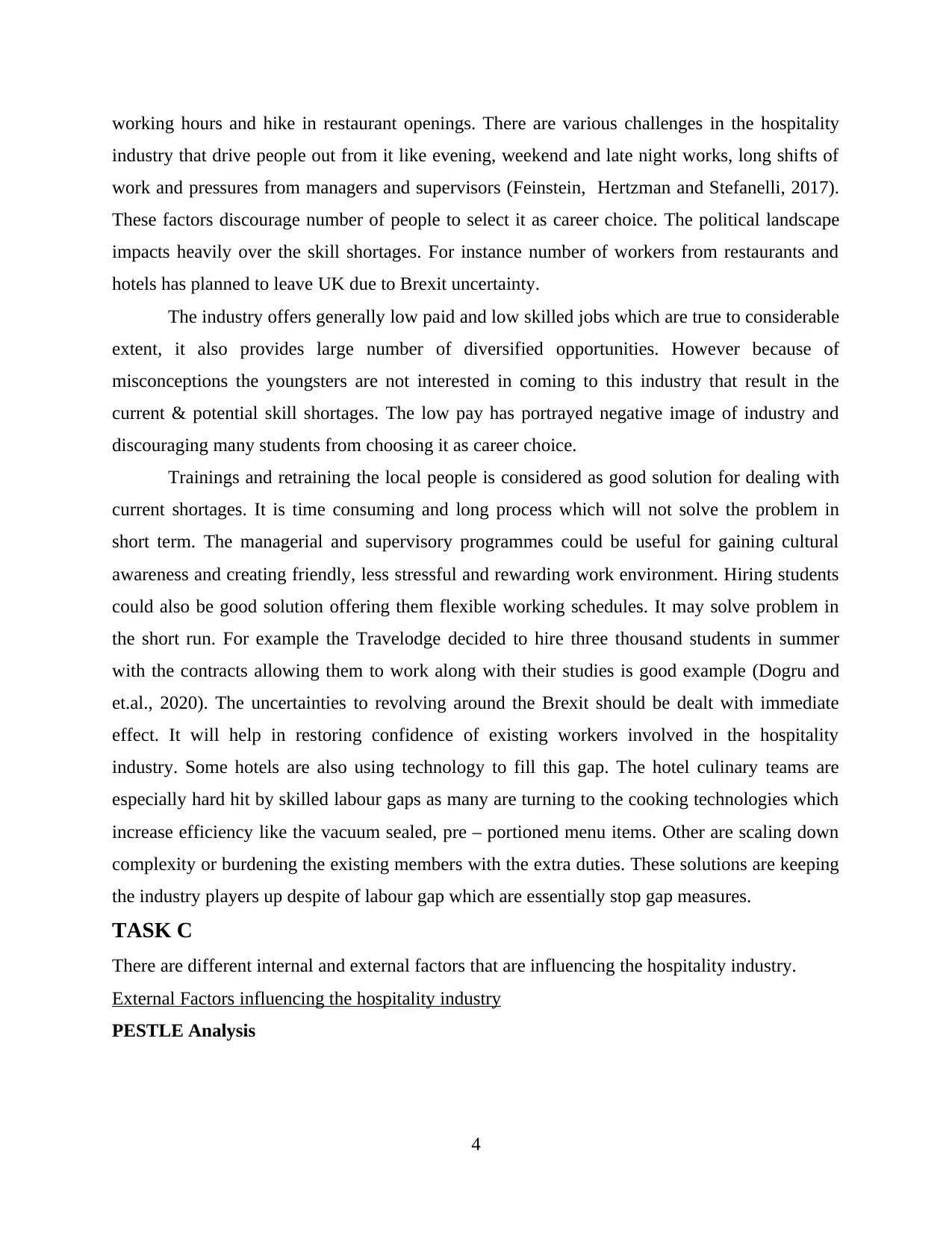
working hours and hike in restaurant openings. There are various challenges in the hospitality
industry that drive people out from it like evening, weekend and late night works, long shifts of
work and pressures from managers and supervisors (Feinstein, Hertzman and Stefanelli, 2017).
These factors discourage number of people to select it as career choice. The political landscape
impacts heavily over the skill shortages. For instance number of workers from restaurants and
hotels has planned to leave UK due to Brexit uncertainty.
The industry offers generally low paid and low skilled jobs which are true to considerable
extent, it also provides large number of diversified opportunities. However because of
misconceptions the youngsters are not interested in coming to this industry that result in the
current & potential skill shortages. The low pay has portrayed negative image of industry and
discouraging many students from choosing it as career choice.
Trainings and retraining the local people is considered as good solution for dealing with
current shortages. It is time consuming and long process which will not solve the problem in
short term. The managerial and supervisory programmes could be useful for gaining cultural
awareness and creating friendly, less stressful and rewarding work environment. Hiring students
could also be good solution offering them flexible working schedules. It may solve problem in
the short run. For example the Travelodge decided to hire three thousand students in summer
with the contracts allowing them to work along with their studies is good example (Dogru and
et.al., 2020). The uncertainties to revolving around the Brexit should be dealt with immediate
effect. It will help in restoring confidence of existing workers involved in the hospitality
industry. Some hotels are also using technology to fill this gap. The hotel culinary teams are
especially hard hit by skilled labour gaps as many are turning to the cooking technologies which
increase efficiency like the vacuum sealed, pre – portioned menu items. Other are scaling down
complexity or burdening the existing members with the extra duties. These solutions are keeping
the industry players up despite of labour gap which are essentially stop gap measures.
TASK C
There are different internal and external factors that are influencing the hospitality industry.
External Factors influencing the hospitality industry
PESTLE Analysis
4
industry that drive people out from it like evening, weekend and late night works, long shifts of
work and pressures from managers and supervisors (Feinstein, Hertzman and Stefanelli, 2017).
These factors discourage number of people to select it as career choice. The political landscape
impacts heavily over the skill shortages. For instance number of workers from restaurants and
hotels has planned to leave UK due to Brexit uncertainty.
The industry offers generally low paid and low skilled jobs which are true to considerable
extent, it also provides large number of diversified opportunities. However because of
misconceptions the youngsters are not interested in coming to this industry that result in the
current & potential skill shortages. The low pay has portrayed negative image of industry and
discouraging many students from choosing it as career choice.
Trainings and retraining the local people is considered as good solution for dealing with
current shortages. It is time consuming and long process which will not solve the problem in
short term. The managerial and supervisory programmes could be useful for gaining cultural
awareness and creating friendly, less stressful and rewarding work environment. Hiring students
could also be good solution offering them flexible working schedules. It may solve problem in
the short run. For example the Travelodge decided to hire three thousand students in summer
with the contracts allowing them to work along with their studies is good example (Dogru and
et.al., 2020). The uncertainties to revolving around the Brexit should be dealt with immediate
effect. It will help in restoring confidence of existing workers involved in the hospitality
industry. Some hotels are also using technology to fill this gap. The hotel culinary teams are
especially hard hit by skilled labour gaps as many are turning to the cooking technologies which
increase efficiency like the vacuum sealed, pre – portioned menu items. Other are scaling down
complexity or burdening the existing members with the extra duties. These solutions are keeping
the industry players up despite of labour gap which are essentially stop gap measures.
TASK C
There are different internal and external factors that are influencing the hospitality industry.
External Factors influencing the hospitality industry
PESTLE Analysis
4
⊘ This is a preview!⊘
Do you want full access?
Subscribe today to unlock all pages.

Trusted by 1+ million students worldwide
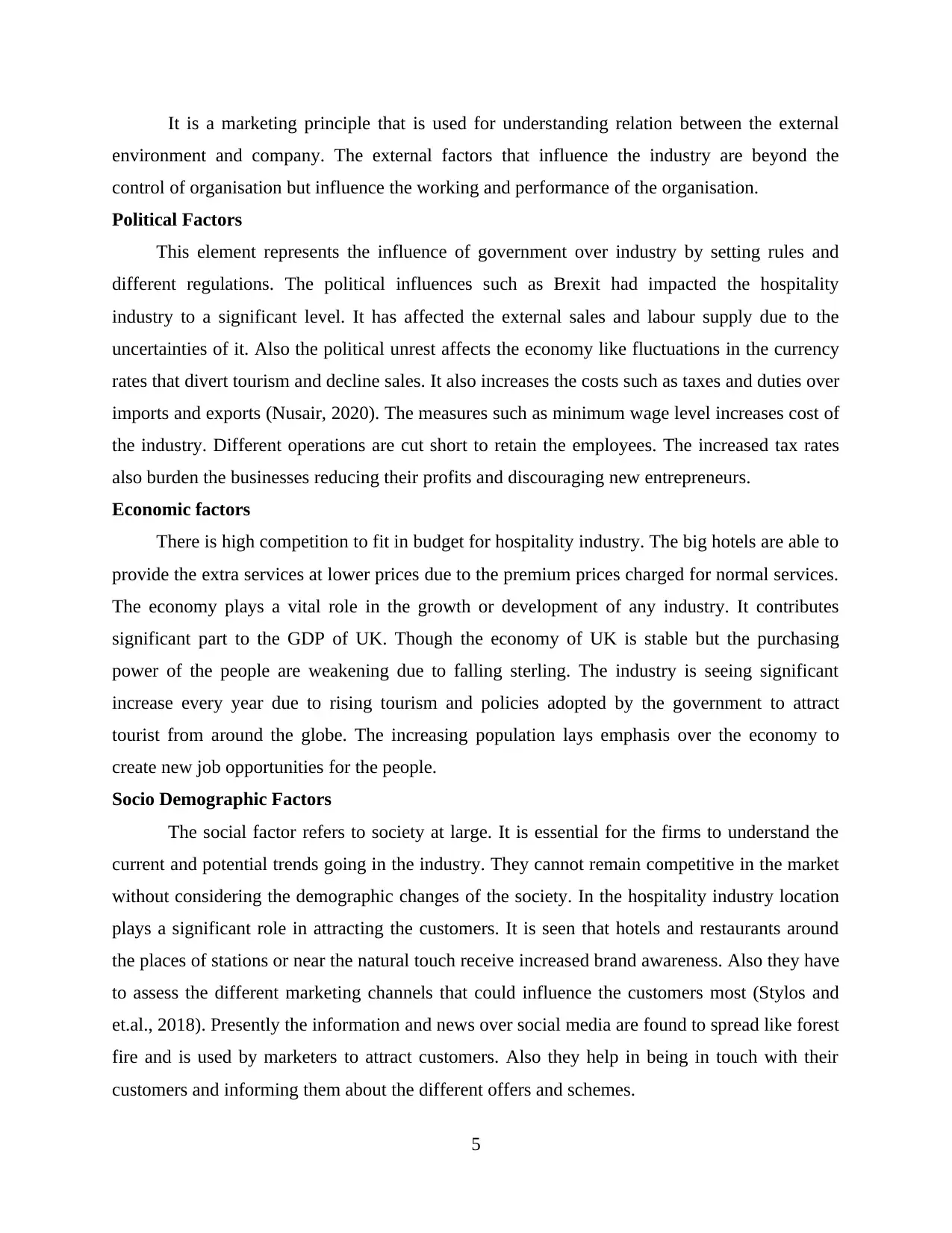
It is a marketing principle that is used for understanding relation between the external
environment and company. The external factors that influence the industry are beyond the
control of organisation but influence the working and performance of the organisation.
Political Factors
This element represents the influence of government over industry by setting rules and
different regulations. The political influences such as Brexit had impacted the hospitality
industry to a significant level. It has affected the external sales and labour supply due to the
uncertainties of it. Also the political unrest affects the economy like fluctuations in the currency
rates that divert tourism and decline sales. It also increases the costs such as taxes and duties over
imports and exports (Nusair, 2020). The measures such as minimum wage level increases cost of
the industry. Different operations are cut short to retain the employees. The increased tax rates
also burden the businesses reducing their profits and discouraging new entrepreneurs.
Economic factors
There is high competition to fit in budget for hospitality industry. The big hotels are able to
provide the extra services at lower prices due to the premium prices charged for normal services.
The economy plays a vital role in the growth or development of any industry. It contributes
significant part to the GDP of UK. Though the economy of UK is stable but the purchasing
power of the people are weakening due to falling sterling. The industry is seeing significant
increase every year due to rising tourism and policies adopted by the government to attract
tourist from around the globe. The increasing population lays emphasis over the economy to
create new job opportunities for the people.
Socio Demographic Factors
The social factor refers to society at large. It is essential for the firms to understand the
current and potential trends going in the industry. They cannot remain competitive in the market
without considering the demographic changes of the society. In the hospitality industry location
plays a significant role in attracting the customers. It is seen that hotels and restaurants around
the places of stations or near the natural touch receive increased brand awareness. Also they have
to assess the different marketing channels that could influence the customers most (Stylos and
et.al., 2018). Presently the information and news over social media are found to spread like forest
fire and is used by marketers to attract customers. Also they help in being in touch with their
customers and informing them about the different offers and schemes.
5
environment and company. The external factors that influence the industry are beyond the
control of organisation but influence the working and performance of the organisation.
Political Factors
This element represents the influence of government over industry by setting rules and
different regulations. The political influences such as Brexit had impacted the hospitality
industry to a significant level. It has affected the external sales and labour supply due to the
uncertainties of it. Also the political unrest affects the economy like fluctuations in the currency
rates that divert tourism and decline sales. It also increases the costs such as taxes and duties over
imports and exports (Nusair, 2020). The measures such as minimum wage level increases cost of
the industry. Different operations are cut short to retain the employees. The increased tax rates
also burden the businesses reducing their profits and discouraging new entrepreneurs.
Economic factors
There is high competition to fit in budget for hospitality industry. The big hotels are able to
provide the extra services at lower prices due to the premium prices charged for normal services.
The economy plays a vital role in the growth or development of any industry. It contributes
significant part to the GDP of UK. Though the economy of UK is stable but the purchasing
power of the people are weakening due to falling sterling. The industry is seeing significant
increase every year due to rising tourism and policies adopted by the government to attract
tourist from around the globe. The increasing population lays emphasis over the economy to
create new job opportunities for the people.
Socio Demographic Factors
The social factor refers to society at large. It is essential for the firms to understand the
current and potential trends going in the industry. They cannot remain competitive in the market
without considering the demographic changes of the society. In the hospitality industry location
plays a significant role in attracting the customers. It is seen that hotels and restaurants around
the places of stations or near the natural touch receive increased brand awareness. Also they have
to assess the different marketing channels that could influence the customers most (Stylos and
et.al., 2018). Presently the information and news over social media are found to spread like forest
fire and is used by marketers to attract customers. Also they help in being in touch with their
customers and informing them about the different offers and schemes.
5
Paraphrase This Document
Need a fresh take? Get an instant paraphrase of this document with our AI Paraphraser
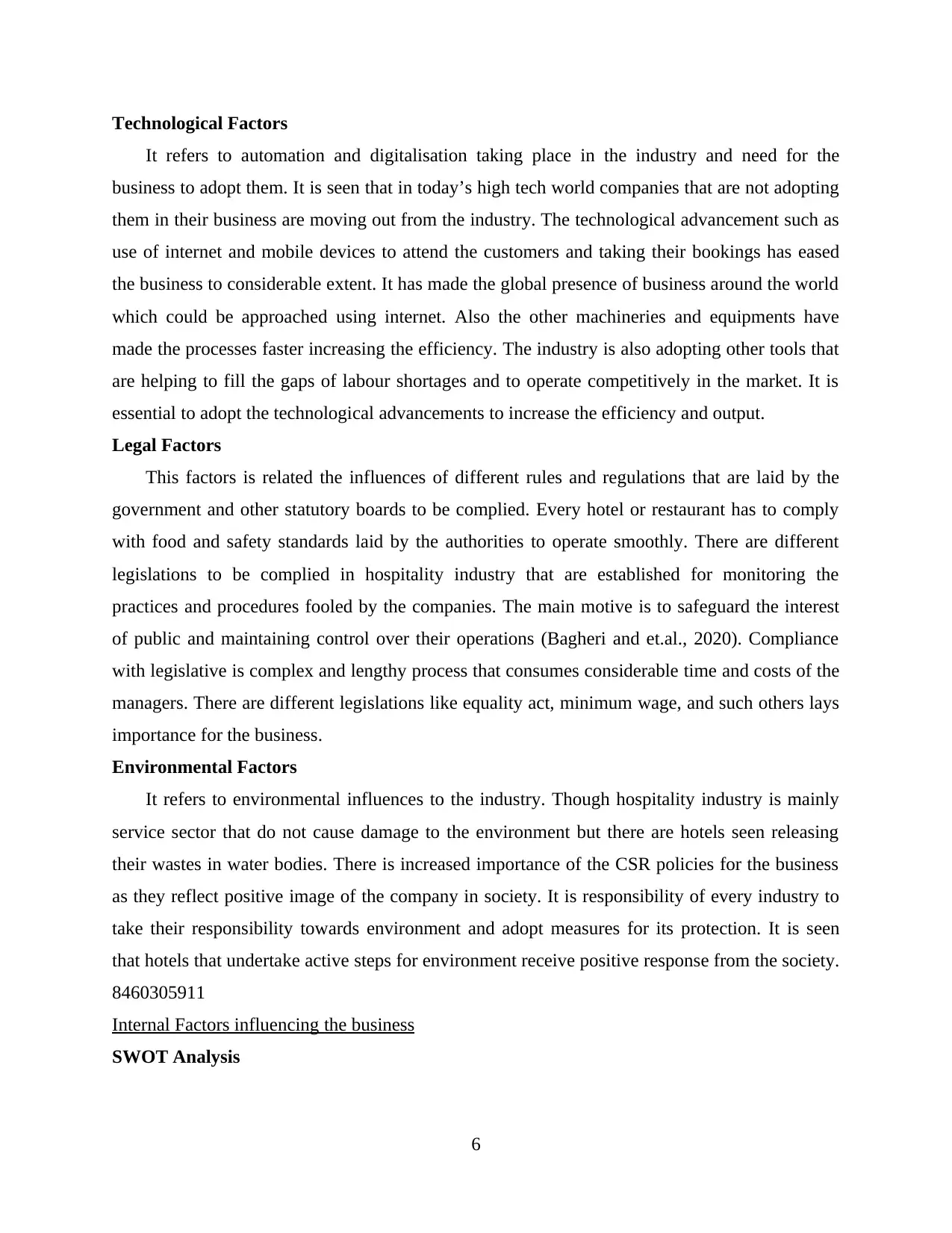
Technological Factors
It refers to automation and digitalisation taking place in the industry and need for the
business to adopt them. It is seen that in today’s high tech world companies that are not adopting
them in their business are moving out from the industry. The technological advancement such as
use of internet and mobile devices to attend the customers and taking their bookings has eased
the business to considerable extent. It has made the global presence of business around the world
which could be approached using internet. Also the other machineries and equipments have
made the processes faster increasing the efficiency. The industry is also adopting other tools that
are helping to fill the gaps of labour shortages and to operate competitively in the market. It is
essential to adopt the technological advancements to increase the efficiency and output.
Legal Factors
This factors is related the influences of different rules and regulations that are laid by the
government and other statutory boards to be complied. Every hotel or restaurant has to comply
with food and safety standards laid by the authorities to operate smoothly. There are different
legislations to be complied in hospitality industry that are established for monitoring the
practices and procedures fooled by the companies. The main motive is to safeguard the interest
of public and maintaining control over their operations (Bagheri and et.al., 2020). Compliance
with legislative is complex and lengthy process that consumes considerable time and costs of the
managers. There are different legislations like equality act, minimum wage, and such others lays
importance for the business.
Environmental Factors
It refers to environmental influences to the industry. Though hospitality industry is mainly
service sector that do not cause damage to the environment but there are hotels seen releasing
their wastes in water bodies. There is increased importance of the CSR policies for the business
as they reflect positive image of the company in society. It is responsibility of every industry to
take their responsibility towards environment and adopt measures for its protection. It is seen
that hotels that undertake active steps for environment receive positive response from the society.
8460305911
Internal Factors influencing the business
SWOT Analysis
6
It refers to automation and digitalisation taking place in the industry and need for the
business to adopt them. It is seen that in today’s high tech world companies that are not adopting
them in their business are moving out from the industry. The technological advancement such as
use of internet and mobile devices to attend the customers and taking their bookings has eased
the business to considerable extent. It has made the global presence of business around the world
which could be approached using internet. Also the other machineries and equipments have
made the processes faster increasing the efficiency. The industry is also adopting other tools that
are helping to fill the gaps of labour shortages and to operate competitively in the market. It is
essential to adopt the technological advancements to increase the efficiency and output.
Legal Factors
This factors is related the influences of different rules and regulations that are laid by the
government and other statutory boards to be complied. Every hotel or restaurant has to comply
with food and safety standards laid by the authorities to operate smoothly. There are different
legislations to be complied in hospitality industry that are established for monitoring the
practices and procedures fooled by the companies. The main motive is to safeguard the interest
of public and maintaining control over their operations (Bagheri and et.al., 2020). Compliance
with legislative is complex and lengthy process that consumes considerable time and costs of the
managers. There are different legislations like equality act, minimum wage, and such others lays
importance for the business.
Environmental Factors
It refers to environmental influences to the industry. Though hospitality industry is mainly
service sector that do not cause damage to the environment but there are hotels seen releasing
their wastes in water bodies. There is increased importance of the CSR policies for the business
as they reflect positive image of the company in society. It is responsibility of every industry to
take their responsibility towards environment and adopt measures for its protection. It is seen
that hotels that undertake active steps for environment receive positive response from the society.
8460305911
Internal Factors influencing the business
SWOT Analysis
6
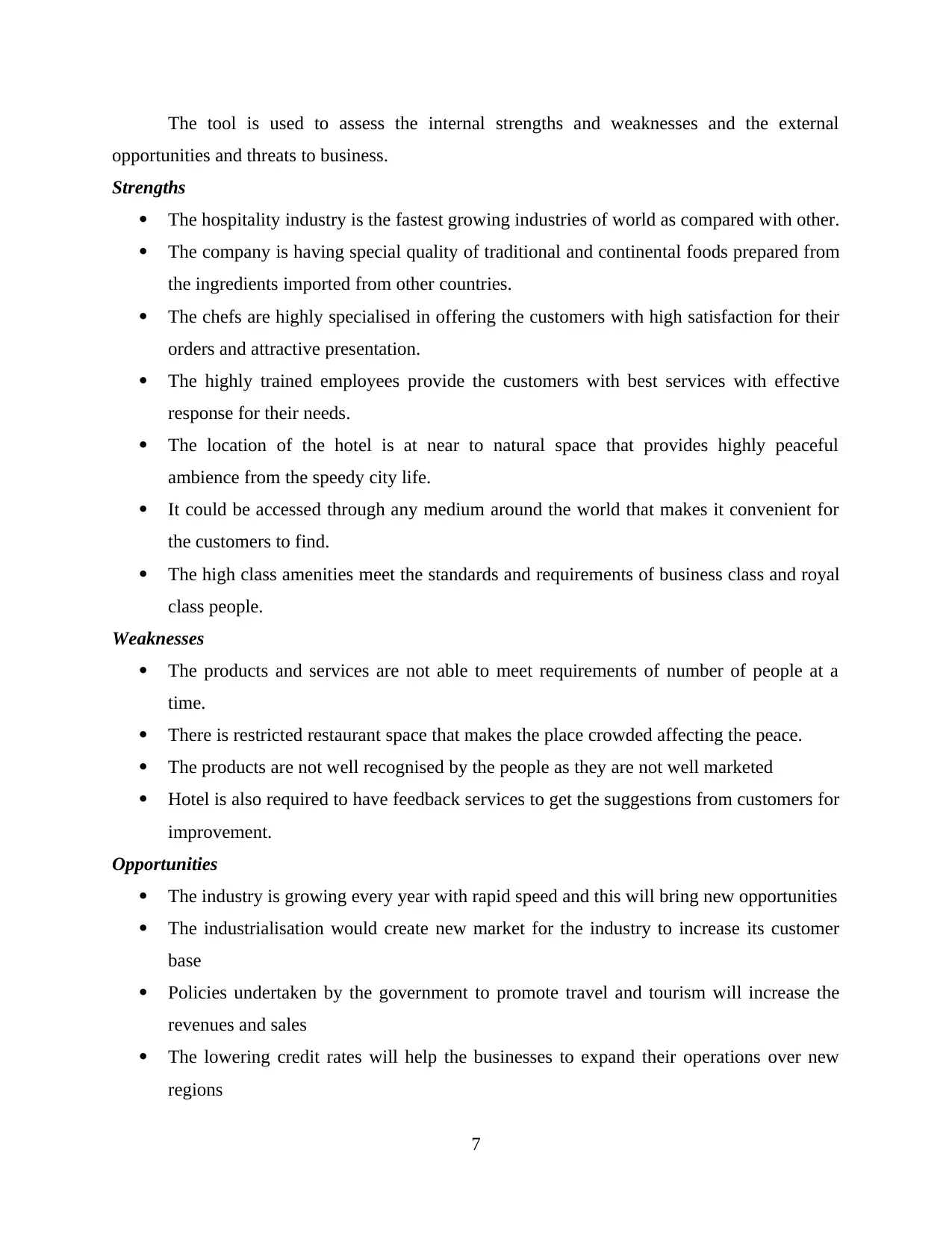
The tool is used to assess the internal strengths and weaknesses and the external
opportunities and threats to business.
Strengths
The hospitality industry is the fastest growing industries of world as compared with other.
The company is having special quality of traditional and continental foods prepared from
the ingredients imported from other countries.
The chefs are highly specialised in offering the customers with high satisfaction for their
orders and attractive presentation.
The highly trained employees provide the customers with best services with effective
response for their needs.
The location of the hotel is at near to natural space that provides highly peaceful
ambience from the speedy city life.
It could be accessed through any medium around the world that makes it convenient for
the customers to find.
The high class amenities meet the standards and requirements of business class and royal
class people.
Weaknesses
The products and services are not able to meet requirements of number of people at a
time.
There is restricted restaurant space that makes the place crowded affecting the peace.
The products are not well recognised by the people as they are not well marketed
Hotel is also required to have feedback services to get the suggestions from customers for
improvement.
Opportunities
The industry is growing every year with rapid speed and this will bring new opportunities
The industrialisation would create new market for the industry to increase its customer
base
Policies undertaken by the government to promote travel and tourism will increase the
revenues and sales
The lowering credit rates will help the businesses to expand their operations over new
regions
7
opportunities and threats to business.
Strengths
The hospitality industry is the fastest growing industries of world as compared with other.
The company is having special quality of traditional and continental foods prepared from
the ingredients imported from other countries.
The chefs are highly specialised in offering the customers with high satisfaction for their
orders and attractive presentation.
The highly trained employees provide the customers with best services with effective
response for their needs.
The location of the hotel is at near to natural space that provides highly peaceful
ambience from the speedy city life.
It could be accessed through any medium around the world that makes it convenient for
the customers to find.
The high class amenities meet the standards and requirements of business class and royal
class people.
Weaknesses
The products and services are not able to meet requirements of number of people at a
time.
There is restricted restaurant space that makes the place crowded affecting the peace.
The products are not well recognised by the people as they are not well marketed
Hotel is also required to have feedback services to get the suggestions from customers for
improvement.
Opportunities
The industry is growing every year with rapid speed and this will bring new opportunities
The industrialisation would create new market for the industry to increase its customer
base
Policies undertaken by the government to promote travel and tourism will increase the
revenues and sales
The lowering credit rates will help the businesses to expand their operations over new
regions
7
⊘ This is a preview!⊘
Do you want full access?
Subscribe today to unlock all pages.

Trusted by 1+ million students worldwide
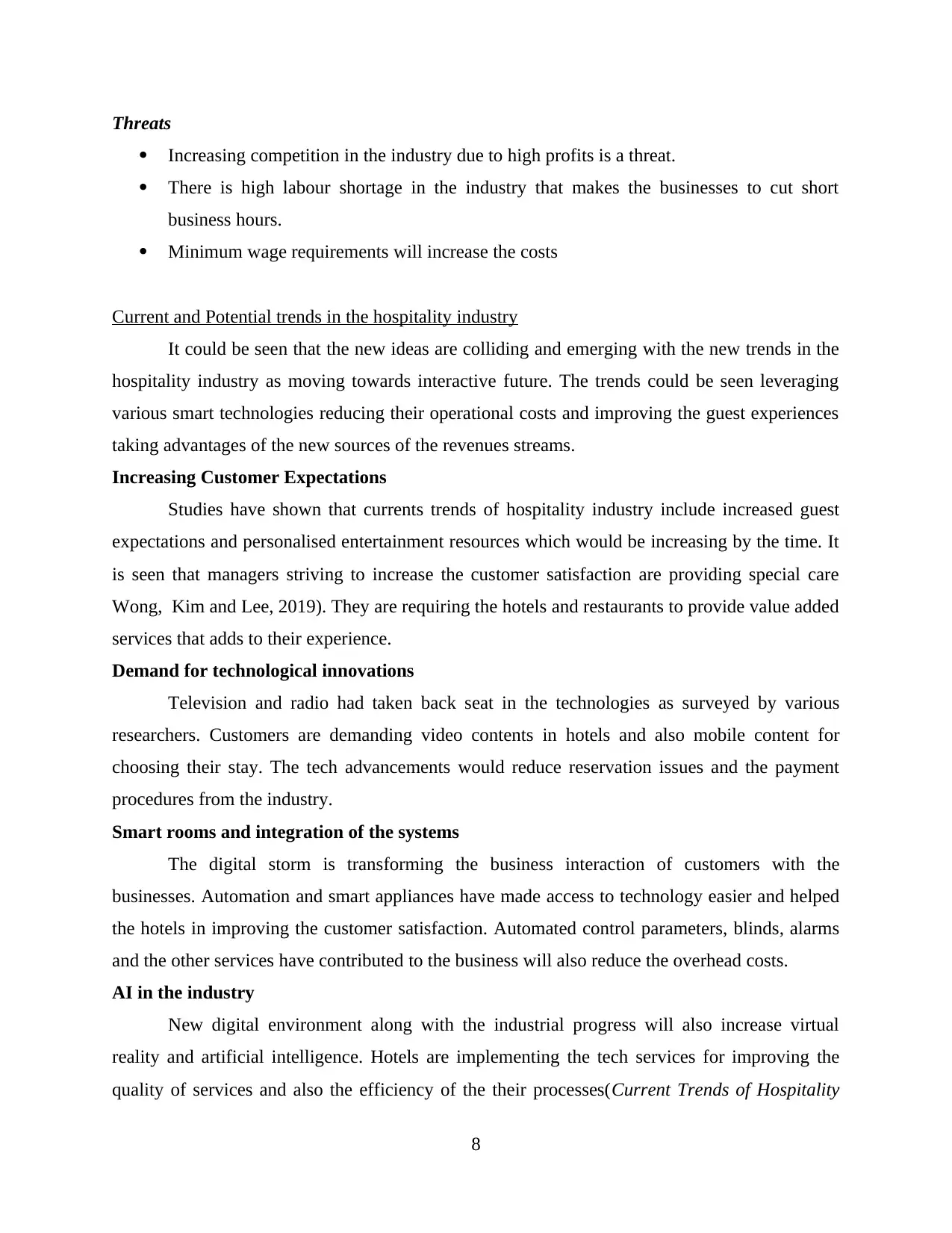
Threats
Increasing competition in the industry due to high profits is a threat.
There is high labour shortage in the industry that makes the businesses to cut short
business hours.
Minimum wage requirements will increase the costs
Current and Potential trends in the hospitality industry
It could be seen that the new ideas are colliding and emerging with the new trends in the
hospitality industry as moving towards interactive future. The trends could be seen leveraging
various smart technologies reducing their operational costs and improving the guest experiences
taking advantages of the new sources of the revenues streams.
Increasing Customer Expectations
Studies have shown that currents trends of hospitality industry include increased guest
expectations and personalised entertainment resources which would be increasing by the time. It
is seen that managers striving to increase the customer satisfaction are providing special care
Wong, Kim and Lee, 2019). They are requiring the hotels and restaurants to provide value added
services that adds to their experience.
Demand for technological innovations
Television and radio had taken back seat in the technologies as surveyed by various
researchers. Customers are demanding video contents in hotels and also mobile content for
choosing their stay. The tech advancements would reduce reservation issues and the payment
procedures from the industry.
Smart rooms and integration of the systems
The digital storm is transforming the business interaction of customers with the
businesses. Automation and smart appliances have made access to technology easier and helped
the hotels in improving the customer satisfaction. Automated control parameters, blinds, alarms
and the other services have contributed to the business will also reduce the overhead costs.
AI in the industry
New digital environment along with the industrial progress will also increase virtual
reality and artificial intelligence. Hotels are implementing the tech services for improving the
quality of services and also the efficiency of the their processes(Current Trends of Hospitality
8
Increasing competition in the industry due to high profits is a threat.
There is high labour shortage in the industry that makes the businesses to cut short
business hours.
Minimum wage requirements will increase the costs
Current and Potential trends in the hospitality industry
It could be seen that the new ideas are colliding and emerging with the new trends in the
hospitality industry as moving towards interactive future. The trends could be seen leveraging
various smart technologies reducing their operational costs and improving the guest experiences
taking advantages of the new sources of the revenues streams.
Increasing Customer Expectations
Studies have shown that currents trends of hospitality industry include increased guest
expectations and personalised entertainment resources which would be increasing by the time. It
is seen that managers striving to increase the customer satisfaction are providing special care
Wong, Kim and Lee, 2019). They are requiring the hotels and restaurants to provide value added
services that adds to their experience.
Demand for technological innovations
Television and radio had taken back seat in the technologies as surveyed by various
researchers. Customers are demanding video contents in hotels and also mobile content for
choosing their stay. The tech advancements would reduce reservation issues and the payment
procedures from the industry.
Smart rooms and integration of the systems
The digital storm is transforming the business interaction of customers with the
businesses. Automation and smart appliances have made access to technology easier and helped
the hotels in improving the customer satisfaction. Automated control parameters, blinds, alarms
and the other services have contributed to the business will also reduce the overhead costs.
AI in the industry
New digital environment along with the industrial progress will also increase virtual
reality and artificial intelligence. Hotels are implementing the tech services for improving the
quality of services and also the efficiency of the their processes(Current Trends of Hospitality
8
Paraphrase This Document
Need a fresh take? Get an instant paraphrase of this document with our AI Paraphraser
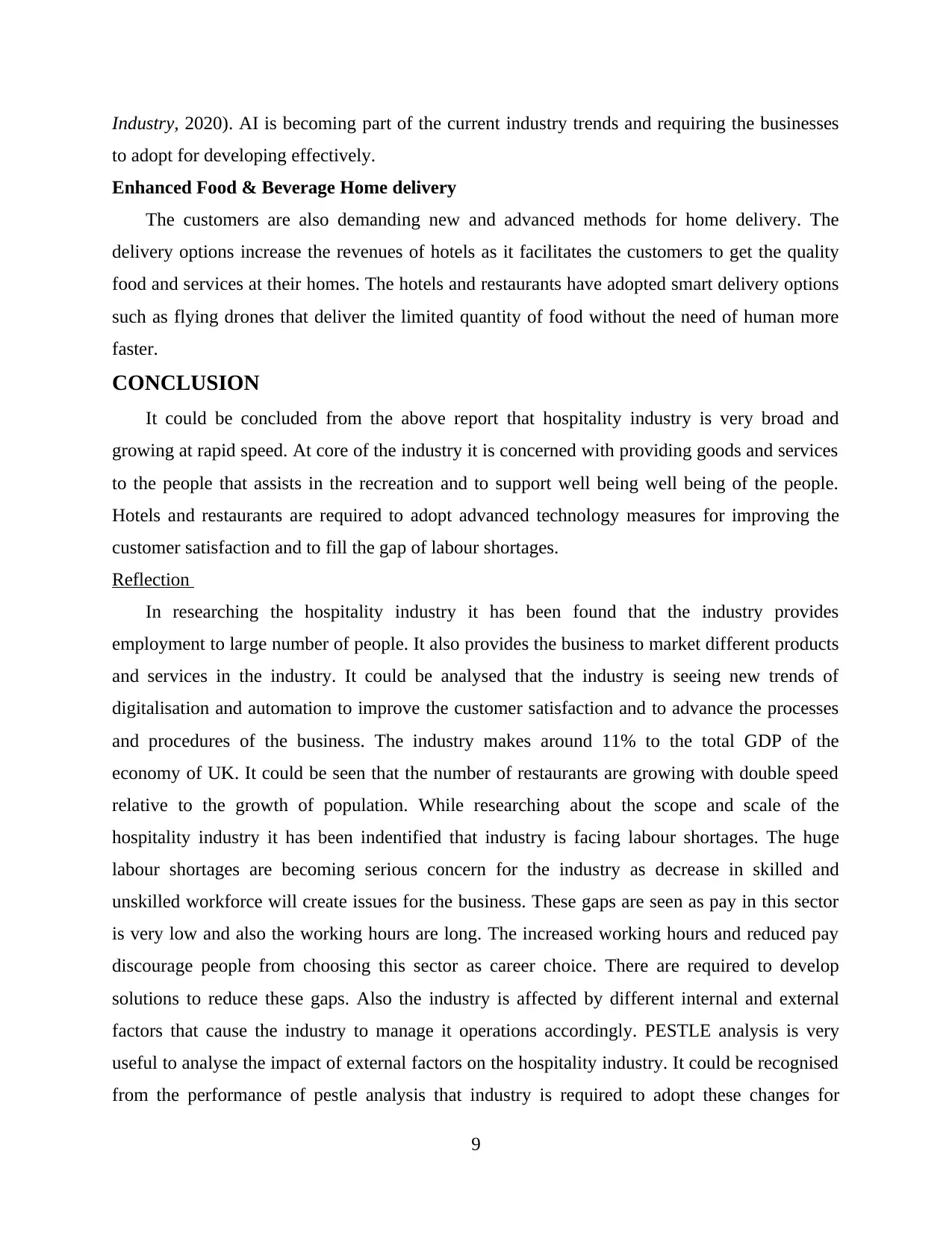
Industry, 2020). AI is becoming part of the current industry trends and requiring the businesses
to adopt for developing effectively.
Enhanced Food & Beverage Home delivery
The customers are also demanding new and advanced methods for home delivery. The
delivery options increase the revenues of hotels as it facilitates the customers to get the quality
food and services at their homes. The hotels and restaurants have adopted smart delivery options
such as flying drones that deliver the limited quantity of food without the need of human more
faster.
CONCLUSION
It could be concluded from the above report that hospitality industry is very broad and
growing at rapid speed. At core of the industry it is concerned with providing goods and services
to the people that assists in the recreation and to support well being well being of the people.
Hotels and restaurants are required to adopt advanced technology measures for improving the
customer satisfaction and to fill the gap of labour shortages.
Reflection
In researching the hospitality industry it has been found that the industry provides
employment to large number of people. It also provides the business to market different products
and services in the industry. It could be analysed that the industry is seeing new trends of
digitalisation and automation to improve the customer satisfaction and to advance the processes
and procedures of the business. The industry makes around 11% to the total GDP of the
economy of UK. It could be seen that the number of restaurants are growing with double speed
relative to the growth of population. While researching about the scope and scale of the
hospitality industry it has been indentified that industry is facing labour shortages. The huge
labour shortages are becoming serious concern for the industry as decrease in skilled and
unskilled workforce will create issues for the business. These gaps are seen as pay in this sector
is very low and also the working hours are long. The increased working hours and reduced pay
discourage people from choosing this sector as career choice. There are required to develop
solutions to reduce these gaps. Also the industry is affected by different internal and external
factors that cause the industry to manage it operations accordingly. PESTLE analysis is very
useful to analyse the impact of external factors on the hospitality industry. It could be recognised
from the performance of pestle analysis that industry is required to adopt these changes for
9
to adopt for developing effectively.
Enhanced Food & Beverage Home delivery
The customers are also demanding new and advanced methods for home delivery. The
delivery options increase the revenues of hotels as it facilitates the customers to get the quality
food and services at their homes. The hotels and restaurants have adopted smart delivery options
such as flying drones that deliver the limited quantity of food without the need of human more
faster.
CONCLUSION
It could be concluded from the above report that hospitality industry is very broad and
growing at rapid speed. At core of the industry it is concerned with providing goods and services
to the people that assists in the recreation and to support well being well being of the people.
Hotels and restaurants are required to adopt advanced technology measures for improving the
customer satisfaction and to fill the gap of labour shortages.
Reflection
In researching the hospitality industry it has been found that the industry provides
employment to large number of people. It also provides the business to market different products
and services in the industry. It could be analysed that the industry is seeing new trends of
digitalisation and automation to improve the customer satisfaction and to advance the processes
and procedures of the business. The industry makes around 11% to the total GDP of the
economy of UK. It could be seen that the number of restaurants are growing with double speed
relative to the growth of population. While researching about the scope and scale of the
hospitality industry it has been indentified that industry is facing labour shortages. The huge
labour shortages are becoming serious concern for the industry as decrease in skilled and
unskilled workforce will create issues for the business. These gaps are seen as pay in this sector
is very low and also the working hours are long. The increased working hours and reduced pay
discourage people from choosing this sector as career choice. There are required to develop
solutions to reduce these gaps. Also the industry is affected by different internal and external
factors that cause the industry to manage it operations accordingly. PESTLE analysis is very
useful to analyse the impact of external factors on the hospitality industry. It could be recognised
from the performance of pestle analysis that industry is required to adopt these changes for
9
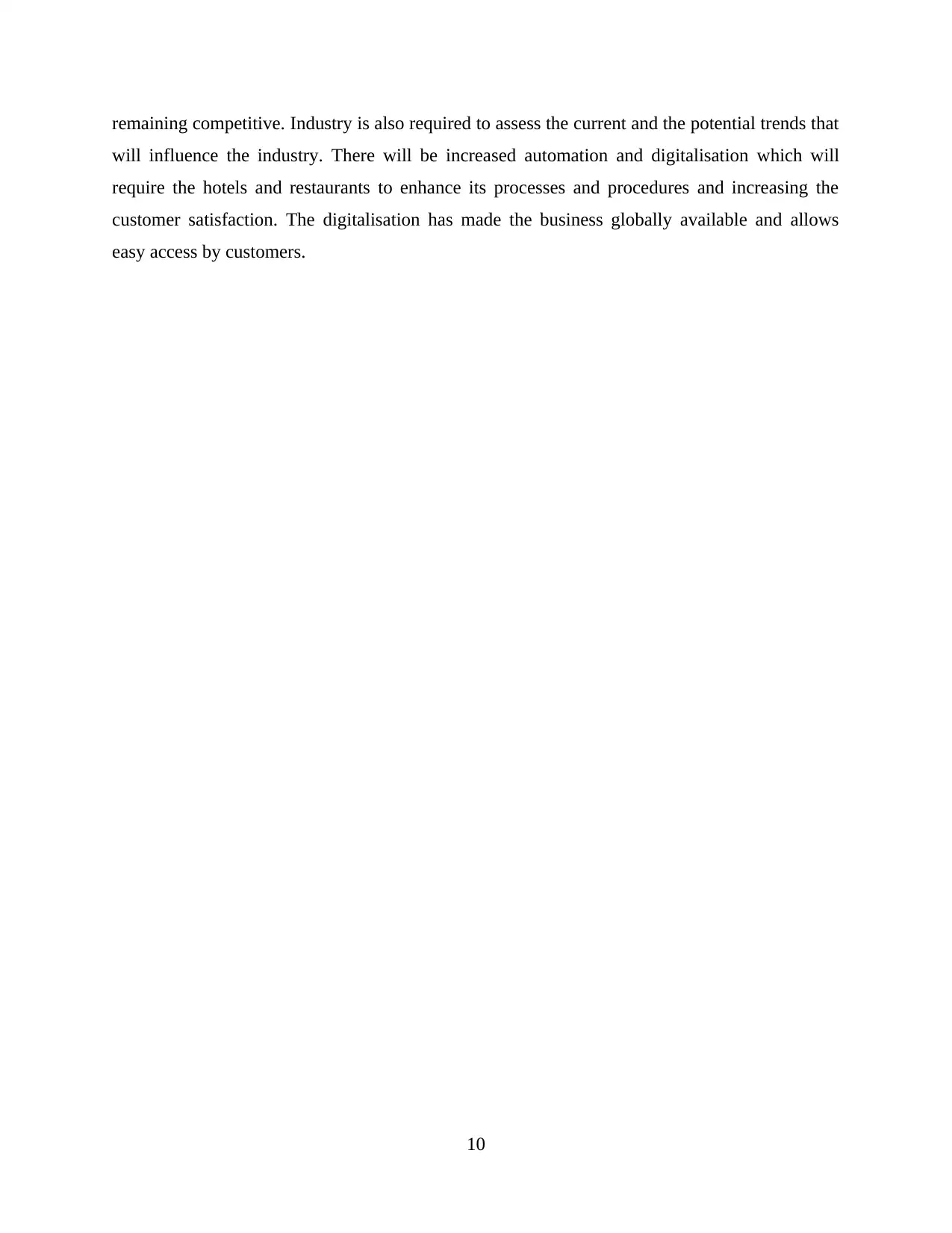
remaining competitive. Industry is also required to assess the current and the potential trends that
will influence the industry. There will be increased automation and digitalisation which will
require the hotels and restaurants to enhance its processes and procedures and increasing the
customer satisfaction. The digitalisation has made the business globally available and allows
easy access by customers.
10
will influence the industry. There will be increased automation and digitalisation which will
require the hotels and restaurants to enhance its processes and procedures and increasing the
customer satisfaction. The digitalisation has made the business globally available and allows
easy access by customers.
10
⊘ This is a preview!⊘
Do you want full access?
Subscribe today to unlock all pages.

Trusted by 1+ million students worldwide
1 out of 13
Related Documents
Your All-in-One AI-Powered Toolkit for Academic Success.
+13062052269
info@desklib.com
Available 24*7 on WhatsApp / Email
![[object Object]](/_next/static/media/star-bottom.7253800d.svg)
Unlock your academic potential
Copyright © 2020–2026 A2Z Services. All Rights Reserved. Developed and managed by ZUCOL.





